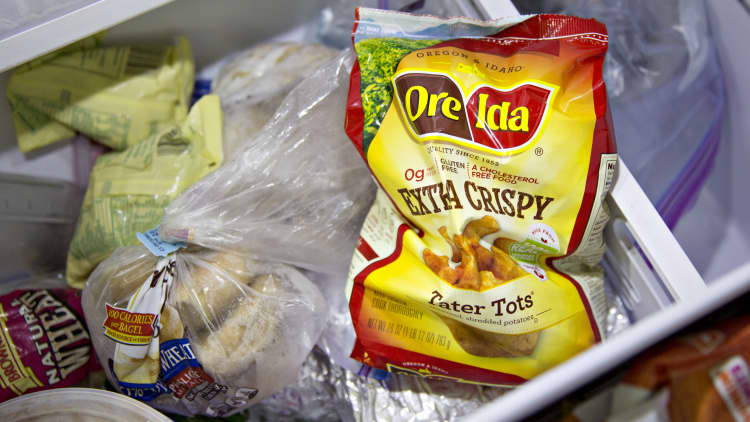
Tater Tot maker Ore-Ida is the latest brand Kraft Heinz is considering shedding as it scrambles to pay down debt and restructure its business following a disastrous quarterly report.
Kraft Heinz has hired investment bank Evercore Partners to prepare a potential sale of its Ore-Ida brand, people familiar with the situation told CNBC. The brand could fetch roughly $1.5 billion to $2 billion, the people said, cautioning the process is still early and valuation is subject to buyer enthusiasm.
While Kraft Heinz's focus is on the frozen potato maker, it would also consider a sale of its entire frozen food business, which includes brands like Smart Ones and Devour, should there be significant buyer interest, the people said.
Likely buyers could include Conagra, frozen potato company Lamb Weston, as well as private equity firms, said the people.
The people requested anonymity because the information is confidential. A spokesperson for Kraft Heinz declined to comment.
The potential divestitures come as Kraft Heinz is in the midst of its most significant executive shakeup since its formation. On Monday, the consumer giant announced that CEO Bernardo Hees will step down on June 30.
Hees, 49, will be replaced by Miguel Patricio, who worked for two decades at beer giant Anheuser-Busch InBev, including as chief marketing officer from 2012 through last year.
The incoming CEO said his focus will be on improving Kraft Heinz's speed, organic growth, brand building and making the company more consumer focused. He would not comment on potential mergers or divestitures.
But outgoing CEO Hees had said the company is weighing divestitures to pay down debt. Kraft Heinz needs to slim its portfolio in order to bring leverage down to three times EBITDA, rather than the four times at which analysts say it is currently pegged. Analysts note it has $3 billion of debt coming due in 2020, which may have to be refinanced.
Top priority for Kraft Heinz is getting rid of brands it believes are particularly vulnerable to the private label goods now being pushed by retailers. While consumers may be willing to pay a bit more for products for which they have strong brand affinity, like Heinz ketchup, the same cannot be said for other products, like frozen potatoes.
As a whole, the frozen food industry has undergone a transformation in the past several years. As shoppers have focused on fresh food, frozen food had developed a reputation as off-trend, but companies like Conagra and Green Giant owner B&G Foods eventually realized they could revitalize frozen food brands. They have focused on ease of use and the nutritional benefits of freezing fresh food. Kraft Heinz has had its own success with Devour frozen meals and sandwiches.
Maxwell House coffee and Breakstone's cottage cheese and sour cream are among the other brands that Kraft Heinz is evaluating, CNBC has reported.
Kraft Heinz shares were up less than 1 percent in after-hours trading. The stock, which has a market value of more than $40 billion, has fallen 42% over the past year.


